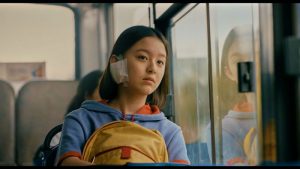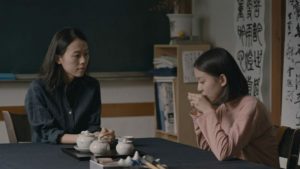[dropca[]A[/dropcap]n older man meets a younger man in a restaurant. Both are gay. The older man, Eric (Romnick Sarmenta), has recently lost his longtime partner Marcus (who we never see… well, not exactly) while the younger man Lance (Elijah Canlas) knew Marcus as his writing tutor, both elder men working as professors at the English language faculty of the university at which Lance is a student.
As the narrative plays out in real time, it moves through a number of difficult areas. Lance was having problems at home; specifically, being beaten by his stepfather, so Eric intervened by letting Lance stay at his place, bringing upon the pair rumours that they were lovers (although everything in the restaurant conversation suggests those rumours to be unfounded). It later transpires that Lance has written his first novel. When Lance presents the manuscript to Eric, Eric accuses Lance of plagiarism after reading the first few pages when Lance walks offscreen for a minute or two to take a toilet break.
Director Lana deploys a variety of theatrical and cinematic tricks in order to make the piece work. He has thought a lot about where to place the camera, and what each specific shot contributes to the whole. He deploys some bravura cinematic tricks. A clever combination of blocking, camera positioning and Lance cleaning his spectacles lenses allows Lance to temporarily transform into Marcus; a similar setup allows Eric talking to Lance to transform into Marcus talking to Lance, all acheived without lap dissolves, traditional flashback techniques, different actors or prosthetics makeup.
Whereas Hitchcock undertook Rope (1948) as a kind of stunt, which still delivered as a thriller, About Us But Not About Us doesn’t have any such genre trappings. It’s fundamentally a film about two people talking over a meal in a restaurant, something Hitch would have decried as “photographs of people talking”. To be fair, it does contain some bravura cinematic tricks, but somehow those look like trickery rather than enhancing the tale of the characters and making the audience feel for their plight. I, for one, didn’t really care about what the characters were going through. Unlike Rope, the film lacks Hitch’s understanding of the psychology of audiences.
Although no masks are worn, the pair are only allowed a 90 minutes because of the restaurant’s post-COVID policies and characters make references to the pandemic throughout. That’s not the subject of the film per se, but it’s good that it at least acknowledges the pandemic in passing when so many movies seem to want to pretend it never happened, that it’s business as usual. Whatever my other opinions of the film, this, at least, is something in its favour.
About Us But Not About Us premieres in the 26th Tallinn Black Nights Film Festival.










